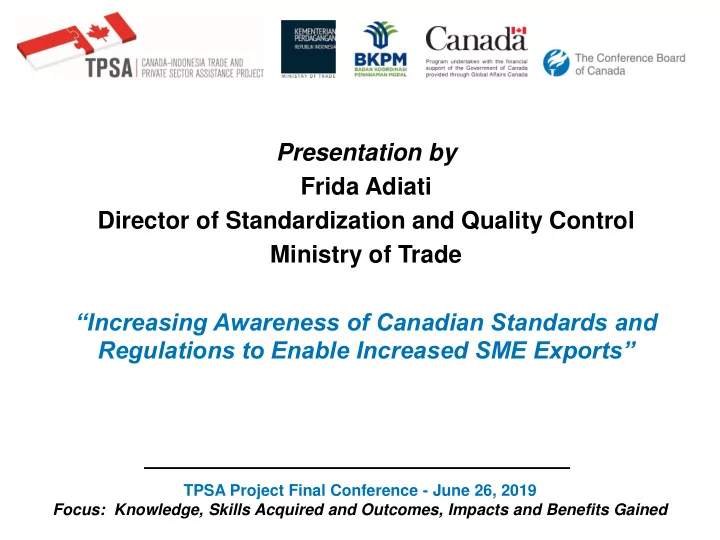

Presentation by Frida Adiati Director of Standardization and Quality Control Ministry of Trade “Increasing Awareness of Canadian Standards and Regulations to Enable Increased SME Exports” TPSA Project Final Conference - June 26, 2019 Focus: Knowledge, Skills Acquired and Outcomes, Impacts and Benefits Gained
Our Objectives 1. In order to assist Indonesian SMEs to comply when exporting: • Need to understand Canadian standards and technical regulations 2. In order to minimize trade barrier and harmonizing standard: • Need to ensure Indonesian testing laboratories can conduct required tests • Need to identify opportunities and processes for mutual recognition of test results and standard certificates • Need to improve laboratory staff competence in understanding Canadian regulatory requirements 3. In order to learn Canada’s National Quality Infrastructures • Need to understand how Canada consumer protection, including market surveillance
Activities held by DG CPTC under TPSA Project: 1. Workshop on Canadian Standards and Food Safety Practices 2. Internship on Food and Product Standards 3. Canada content on INATRIMS portal 4. Training of Indonesian Testing Labs 5. Study Visit to Canada on Standards and Consumer Protection Systems
1. Workshop on Canadian Standards and Food Safety Practices Knowledge and Skills Gained: Gained insights of Canada: • standardization system • Food safety and sanitary and phytosanitary (SPS) systems • participation in international standards bodies • accreditation and conformity assessment systems • Regulation on food safety, animal health, and plant health regulations • Aspects of the Canadian approaches that could be applied in Indonesia. • possibility of acceptance for mutual recognition Benefits, Outcomes and Impacts Gained: Directorate General of Consumer Protection and Trade Compliance (DG CPTC) staff and other organizations related in the workshops, seminars, and study visit know about standardization and consumer protection practices in Canada, especially related to food safety, so they could explore and learn more, which that can be applied in Indonesia.
2. Internship on Food and Product Standards Knowledge and Skills Gained: • Deeper understanding on Canada food and consumer product safety standards and systems • Ways Indonesia to further improve its own system • Understanding of Canada consumer tastes and preferences • Ways government support can strengthen private sectors in Indonesia to access global markets • Improve laboratories capability of testing Benefits, Outcomes and Impacts Gained: • A senior staff member from DG CPTC has a knowledge on Canada consumer product safety systems, including on risk assessment • DG CPTC held an internal workshop to lab staff on testing products based on Canada requirements
3. Canada content on INATRIMS portal Knowledge and Benefits Gained: DG CPTC has a website containing detailed information on Canada standards and regulations for 20 prospective export products/ commodities, Textile and Textile Products, Electronics, Processed Food, Medical Devices, Rubber, Palm Oil, Jewelleries, Fish, Forestry Products, Footwear, Spices, Leather and Leather products, Automotives, Shrimps, Bags, Coconut and Palm Sugar, Cocoa, Coffee, Metal furniture, and Wooden Furniture http://inatrims.kemendag.go.id/index.php?id=negara-kanada Benefits, Outcomes and Impacts Gained: DG CPTC, Indonesian exporters, agencies involved in developing and applying standards, and all Indonesian have an easy access to detailed information on Canadian standards and regulations for that 20 prospective export products
4. Training of Indonesian Testing Labs Knowledge and Skills Gained: The Canada legal framework for testing • Canada compliance requirements for textiles and footwear • The product recall process • Labelling and packaging requirements • Similarities and differences between Canada and US regulations • Hands-on learning of analytical testing methods Benefits, Outcomes and Impacts Gained: 6 product testing laboratories in Indonesia, namely Balai Besar Tekstil Bandung, Balai Besar Kulit, Karet, dan Plastik Yogyakarta, Balai Besar Kerajinan dan Batik Yogyakarta, Balai Pengembangan Industri Persepatuan Sidoarjo, Balai Pengujian Mutu Barang, Direktorat Standardisasi dan Pengendalian Mutu, and PT Sucofindo are able to conduct testing for footwear and apparel products according to Canada testing requirements.
5. Study Visit to Canada on Standards and Consumer Protection Systems Knowledge and Skills Gained: Senior policy makers learned directly about Canada’s systems for: • Standardization and quality control. Including standard development • Consumer protection and empowerment • Quality verification for imported goods • Risk assessment and risk management • Testing and research on consumer products • Metrology and calibration • Analyzing, Market Surveillance and trade compliance system based on information from manufacturers, importers, and other parties. Benefits, Outcomes and Impacts Gained: • Senior policy makers from DG CPTC and Indonesia’s Consumer Protection Agency have learn first hand on Canada consumer protection from the experts • To avoid duplication of testing laboratory Indonesia will identify the possibility to have an MRA
Results of Partnership with the TPSA Project 1. DG CPTC is currently integrating knowledge gained to improve her policy and consumer protection in Indonesia, especially in Metrology. 2. DG CPTC obtains important inputs for establishing Indonesia National Quality Assurance in Indonesia 3. Testing laboratories in Indonesia are able to conduct test on footwear and apparel products according to Canadian standards, which will give benefit to exporters. 4. Better knowledge about Canada standards and technical regulations 5. Building networks with related institutions in Canada
Thank You
Recommend
More recommend